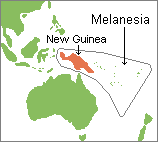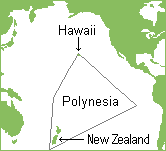Glossary of Terms
A B C D E F G H I J K L M N O P Q R S T U V W X Y Z
Select the first letter of the word you are seeking from the list above
to jump to the appropriate section of the glossary or scroll down to it
- A -
-
acephalous
 society
society - a society in which political power is diffused to the degree that there are no institutionalized political leadership roles such as chiefs and kings. Bands and tribes are acephalous. Most foragers and simple horticulturalists have highly egalitarian, acephalous societies. The word "acephalous" is Greek for "without a head."
- age grades
- age-based categories of people recognized by a culture. In North America, for example, we generally label people as children, teenagers, adults, middle aged, and elderly or senior citizens. See age sets.
- age sets
- age grades that are clearly recognized in a culture as distinct identifiable groups of people. They consist of people of similar age and usually of the same gender who share a common identity and maintain close ties throughout their lives. They also pass through age-related statuses together as a group. The transition between these statuses is usually marked by a rite of passage.
- aquatic
 foraging
foraging - a specialized subsistence pattern that concentrates on fish and/or marine mammal hunting. Aquatic foraging is usually a far more reliable and productive strategy for obtaining food than the diversified hunting and gathering of most foragers who live away from the coasts and major rivers. The most well known aquatic foragers lived on the Northwest Coast of North America from the Klamath River of California to the Aleutian Islands of Alaska. These societies specialized in salmon fishing along the rivers and hunting seals and whales off the coast.
Back to Top
- B -
- band

- the level of political integration in which a society consists only of an association of families living together. Bands are loosely allied by marriage, descent, friendship, and common interest. The primary integrating mechanism is kinship ties. There is no economic class differentiation. All adults of the same gender are more or less equal as far as community decision making is concerned. However, some individuals in a band may stand out for their skills and knowledge. These often are the people who have the best memories, are the best hunters, most successful curers, most gifted speakers, etc. Such people become informal leaders. Most often they are given authority by community consensus arrived at through casual discussion without the need for a formal vote. Leaders generally have temporary political power at best, and they do not have any significant authority relative to other adults within their band. Subsequently, bands are essentially acephalous societies. The total number of people within these societies rarely exceeds a few dozen. Bands are found among foraging societies.
-
bureaucracy

- an administrative system that divides governing tasks into specific categories carried out by different individuals and/or departments. Members of a bureaucracy are referred to as bureaucrats.
Back to Top
- C -
-
cereals

- the edible seeds of grasses. The economically most important cereals include wheat, rice, and corn (maize), oats, rye, millet, and sorghum. These grains provide the bulk of the calories consumed by people in the world today.
- chiefdom

- the level of political integration in which a society has a more or less permanent political leader (i.e., a chief) but no bureaucracy of professional administrators. The chief provides direction and authority for the society as a whole. Sometimes there is an advisory council as well. In a few of the more complex chiefdoms in Africa and Hawaii, there have been paramount chiefs and lesser chiefs who perform some administrative functions. Chiefs and their families generally have a higher standard of living than ordinary people within their society. What makes this possible is that chiefs usually perform a society wide economic redistribution function that is cloaked in the guise of ritual gift giving. This essentially siphons off surplus agricultural products from farmers and then redistributes them throughout the society. In the process, a small amount is held back in order to support the chief's somewhat more lavish lifestyle. The ritualized redistribution of surplus food and other commodities in chiefdoms is, in a sense, the rudimentary beginnings of a taxation system. It is tolerated by people because of the economic advantages that it can provide in addition to social stability. The larger territorial size of chiefdoms often encompasses diverse environmental zones with somewhat different products. The redistribution of agricultural surpluses can serve as a method of providing greater food variety for the populace as a whole. Chiefdoms commonly have a population of tens of thousands of farmers. The large population size generally means that the people have less in common than do those in the smaller societies of bands and tribes. Disputes inevitably arise that cannot be settled by informal means based on kinship and friendship. A chief usually functions as an arbitrator and judge in these cases.
- class
- a group of people in a society who share the same social and economic status. In state level societies of the past, the most important class distinction was between the ruling elite and the commoners. Bands, tribes, and early chiefdoms did not have classes, though individuals were often ranked relative to each other.
Back to Top
- D -
- descent

- socially recognized links between ancestors and descendents, such as the bond between children and their parents.
Back to Top
- E -
-
equestrian
 foraging
foraging - a specialized subsistence pattern in which horses are used extensively in hunting large game animals. Equestrian foragers evolved in only two areas of the world--the Great Plains of North America and the sparse grasslands of Southern Argentina. In both cases, pedestrian foragers acquired horses from Spanish settlers in the early 17th century. Over several generations, horse breeding and riding skills were honed. This resulted in a revolutionary change in these Native American societies. The horse became the principle mode of transportation and dramatically increased hunting success in the pursuit of large animals. These societies became larger, more mobile, and were now able to travel over larger areas throughout the year. Horses allowed them to effectively follow the seasonal migrations of large herbivores over hundreds of miles. In North American the prey of choice was the bison and in South America it was the guanaco.
- ethnic group

- a category or group of people considered to be significantly different from others in terms of cultural (dialect, religion, traditions, etc.) and sometimes physical characteristics (skin color, body shape, etc.). Commonly recognized American ethnic groups include American Indians, Jews, Latinos, Chinese, African Americans ("blacks"), European Americans ("whites"), etc.
-
ethnocentrism

- the deep felt belief that your culture is superior to all others. Being fond of your own way of life and condescending or even hostile toward other cultures is normal for all people. Alien culture traits are often viewed as being not just different but less sensible and even "unnatural." Ethnocentrism is normal for all people in the world.
-
ethnography

- anthropological research in which one learns about the culture of another society through fieldwork and first hand observation in that society. Ethnography is also the term used to refer to books or monographs describing what was learned about the culture of that society.
Back to Top
- F -
-
fictive
kinship

- a socially recognized link between individuals created as an expedient for dealing with special circumstances, such as the bond between a godmother and her godchild. Fictive kinship bonds are based on friendship and other personal relationships rather than marriage and descent.
-
foragers

- people who live in more or less isolated, small societies and obtain their food by foraging wild plants and hunting wild animals. Foragers generally have a passive dependence on what the environment contains. They do not plant crops and the only domesticated animals that they usually have are dogs. Most foraging societies do not establish permanent settlements. Rather, they have relatively temporary encampments with tents or other easily constructed dwellings. The length of time that they stay in any one location is largely determined by the availability of resources. Foragers are also referred to as hunters and gatherers.
Back to Top
- G -
Back to Top
- H -
-
herbivorous

- eating only vegetable foods. Animals that have this sort of diet are herbivores or vegetarians.
-
horticulturalists

- people who obtain most of their food by low intensity farming. This subsistence pattern involves at least part time planting and tending of domesticated food plants. Pigs, chickens, or other relatively small domesticated animals are often raised for food and prestige. Many horticultural societies supplement their farming subsistence base with occasional hunting and gathering of wild plants and animals. They usually practice slash and burn field clearing methods and do not add additional fertilizer or irrigate. Multi-cropping is common. They often have a partial reliance on foraging for wild foods. Their societies are usually larger and more sedentary than those of foragers but still are at a low technological level and relatively small-scale.
Back to Top
- I -
-
intensive agriculture

a subsistence pattern characterized by full-time farming in which large beasts of burden or highly mechanized farm equipment (e.g., rototillers and tractors) are used to prepare the land for planting and later to harvest crops. Intensive agriculture usually involves the use of irrigation or other forms of water management. Often there is mono-cropping with heavy applications of fertilizers, pesticides, and herbicides. This form of agriculture is highly productive but generally capital intensive.
Back to Top
- J -
Back to Top
- K -
- kinship

Back to Top
- L -
- large-scale society
- generally a society with cities, industry, intensive agriculture, and a complex international economy. Such societies have socio-economic classes and a government with hierarchies of officials. The importance of kinship is diminished in comparison to the common pattern of small-scale societies.
- levels of political integration
- a term referring to general types of political systems used to organize and manage societies. As a society's population size and territory grow, it must develop new political solutions to keep from splitting apart. In the 1950's, the American Anthropologist, Elman Service described four levels of political integration that have have been used around the world to solve this problem--band, tribe, chiefdom, and state. While there are some unique cultural variations of each of these levels, they are remarkably similar from one society to another. Subsequently, classifying a society in terms of its level of political integration has proven to be a useful tool in comprehending the wide range of human cultures and societies from small foraging communities to modern nation states.
Back to Top
- M -
 |
|
-
Melanesia

- New Guinea and other nearby islands in the Southwest Pacific Ocean. Indigenous people from this region are referred to as Melanesians.
-
mono-cropping

- planting a crop of only one species in a farm field. This is a common practice with intensive agriculture. While this can be a highly efficient farming strategy, it results in crops that are more susceptible to being wiped out by insects and other parasites. Mono-cropping is also known as "mono-culture". See multi-cropping.
- multi-cropping

- planting a farm field with more than one species. This is a common practice among horticulturalists. Multi-cropping reduces the chances of total crop failure due to insects and other parasites. However, it is far more labor intensive to plant, tend, and harvest. See mono-cropping.
